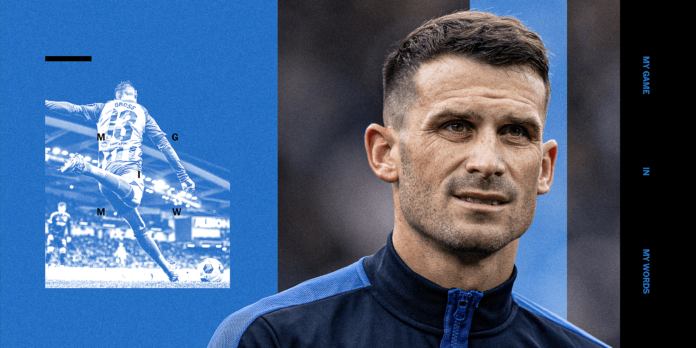Three million pounds does not buy much in football anymore.
But in July 2017, it was enough for Brighton & Hove Albion to sign Pascal Gross from Ingolstadt — their first signing as a Premier League club.
Six and a half years and three head coaches later, first under Chris Hughton, then Graham Potter, and now Roberto De Zerbi, Gross keeps getting better. His longevity means he has the most Premier League goals for Brighton (30); creatively, though, Gross is on a whole other level.
Gross is tied 10th, with Willian, for assists among players currently operating in the Premier League (45). More than 4,000 players have played in the division since 1992, but only 59 of them have set up more goals than Gross — he already has more Premier League assists than the likes of Nani, Michael Carrick, Robbie Fowler, Philippe Coutinho and Cristiano Ronaldo.
When Brighton were asked if Gross would be interested in sitting down and talking through his assists, the media department said, “I think he might because it’s tactical”.
The chat takes place just before 10am on a grey, blustery morning at Brighton’s training ground in Lancing, two days after the club drew 1-1 at home to Everton. Some footballers love, while some hate, rewatching video and analysing their play. As we are about to find out, Gross is absolutely the former.
The first clip is from Brighton’s most recent league game, at home to Everton. Brighton were 1-0 down in second-half injury time when Gross curled a 94th-minute cross for Lewis Dunk to head in an equaliser.
HUGE goal from Dunky on his 400th league appearance! 🤩👏
Our @MonsterEnergy Moment of the Match! ⚡️ pic.twitter.com/NkkRlxdD6a
— Brighton & Hove Albion (@OfficialBHAFC) February 24, 2024
“It’s a bouncing ball. So I had to take a touch, and then the defender (Beto) was too close to me to cross,” says Gross. Having taken the corner from the right, which was cleared, Simon Adingra worked it back out to him.
“I thought about (going) to cross with my left foot, but then I see him really stretching to block the cross. So I thought one more chop will give me a yard to cross”.
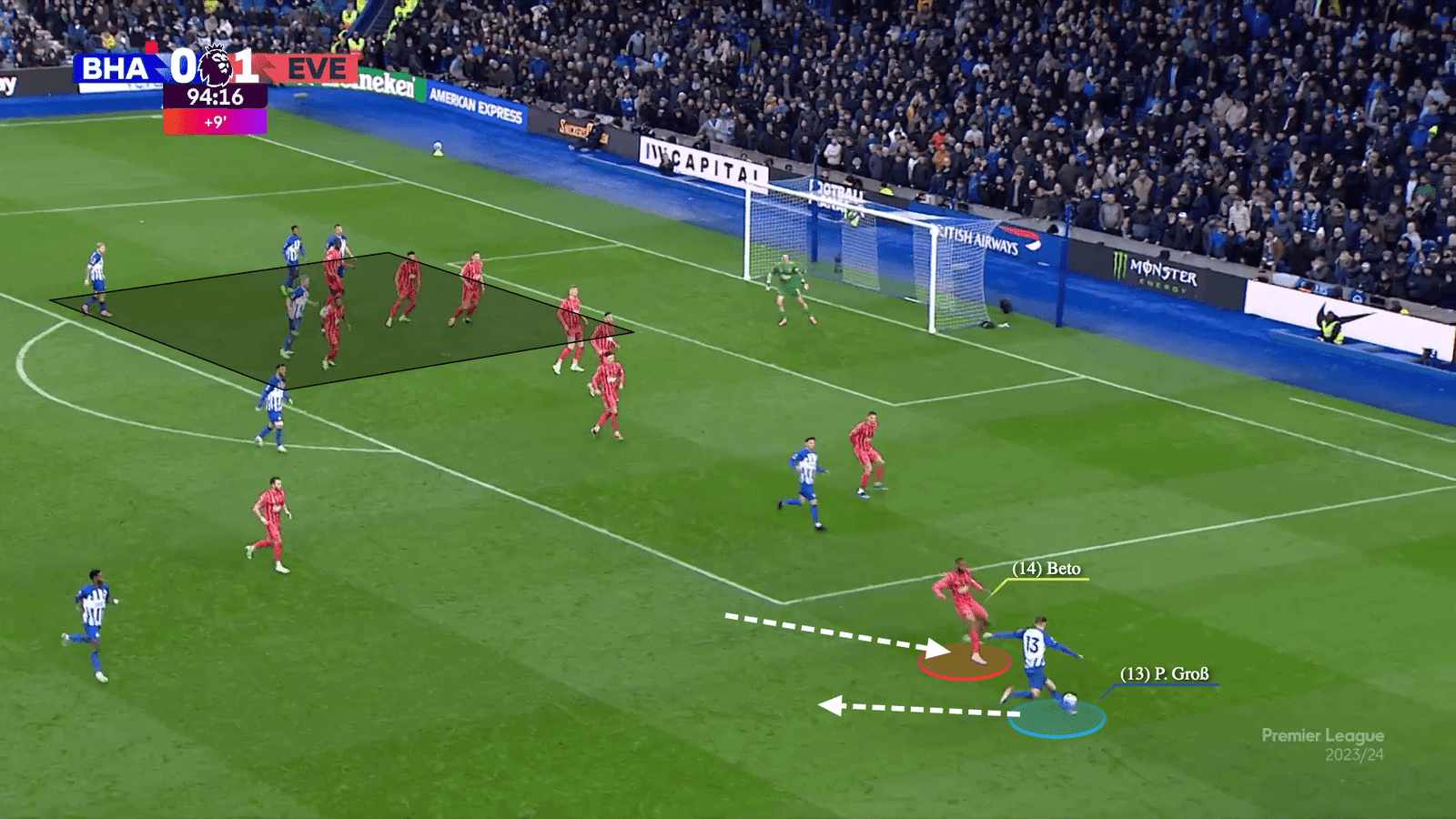
Brighton fans will tell you that this “chop” is a Gross trademark. Here he does it twice, once on each foot, and Beto bites both times.
That delay gives time for Brighton’s attackers, notably Dunk and Jan Paul van Hecke, to take up back-post positions, where they are three-v-three.
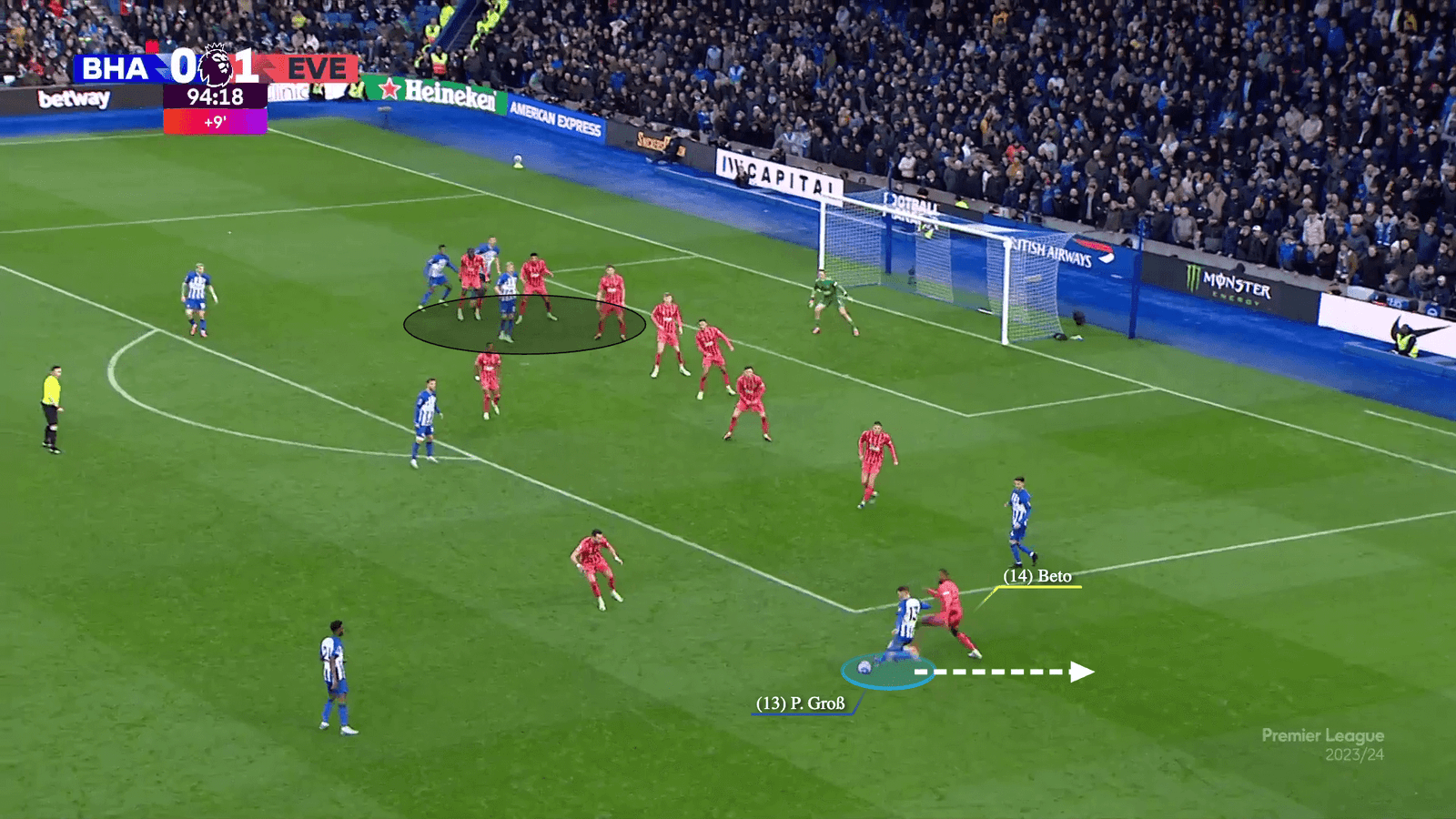
Dunk said that he knew Gross would “chop”, so took a couple of steps back to attack the ball from a deeper position. Even with Beto at full stretch, he can’t block the cross. That was Gross’ seventh Premier League assist for Dunk, his most for any team-mate, and all have been crosses or corners for headers.
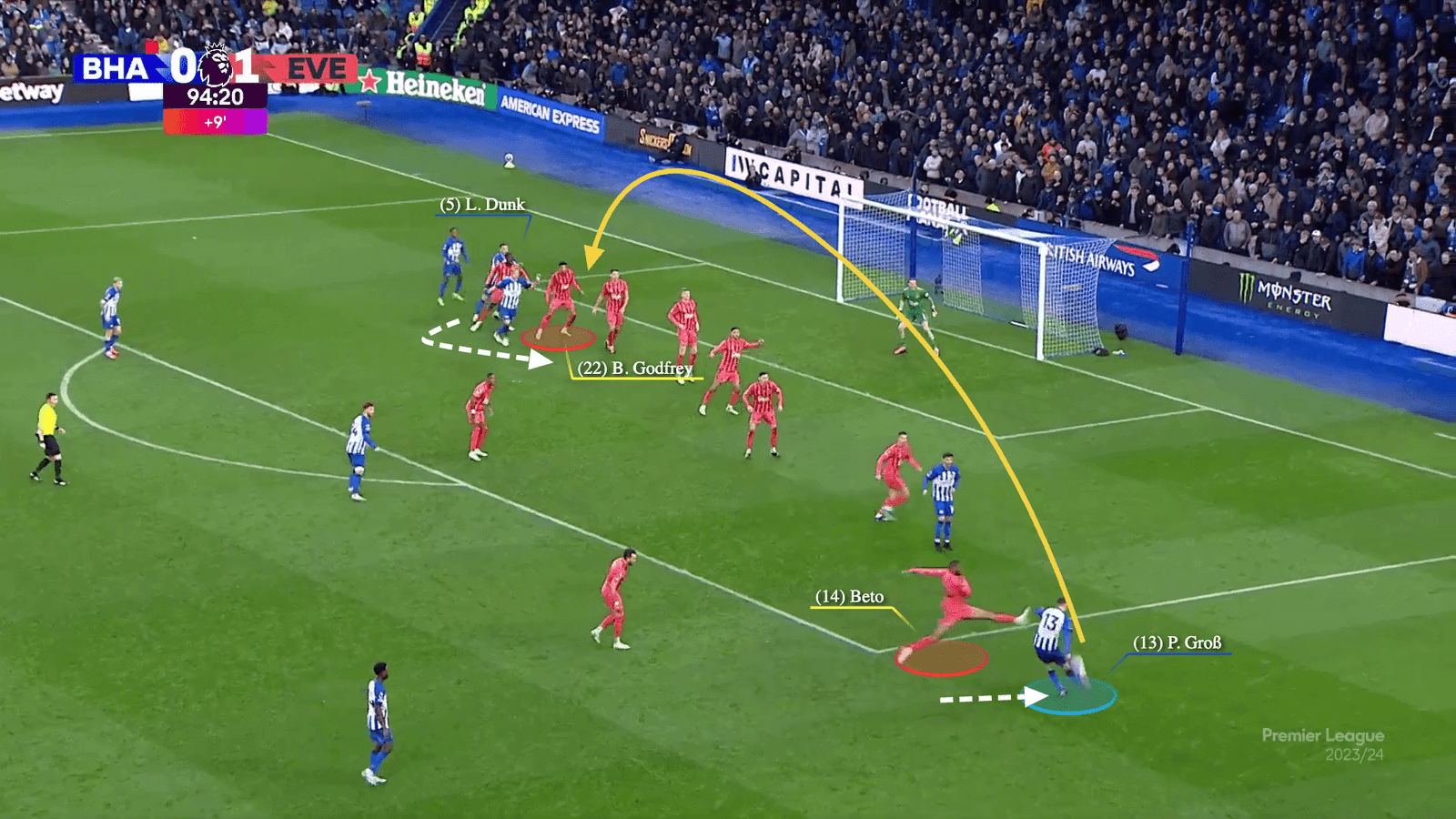
“I always want to get a yard, to shoot, to cross, to pass,” says Gross. “It’s (chopping) just putting the ball to the side, (to) be able to shoot and cross. But, with your other eye, to read the defender’s position. How intense is he trying to block the cross? Because this was really intense, I knew when I chop one more time, he can’t be stretching that much and (still) get on the other side.”
How did he pick up the chop? “Since I’m a little boy, my friends at home always speak about it — they can’t believe I’m still using it,” he says. “Since I was small, I trained this. It looks good but I never do it just to do a skill. I always want to get something after.”
He had a similar assist for another 1-1 draw at home to Burnley in December. From the left this time, he receives Igor Julio’s pass. Aaron Ramsey closes Gross down, so he shapes to cross on his left, then chops.
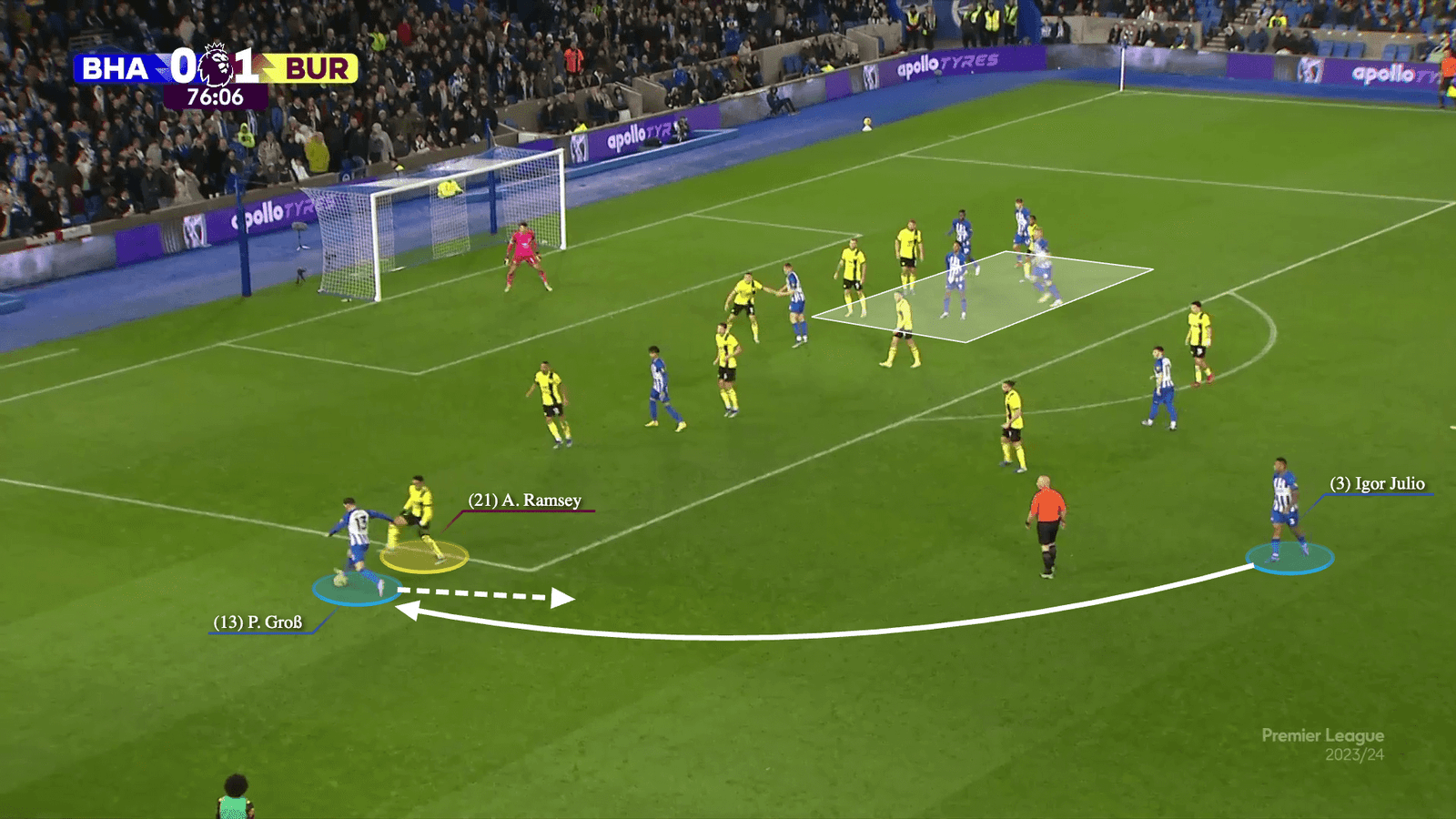
As he chops, Ramsey is still on the move (look at his right foot about to land), and Gross gets his separation.
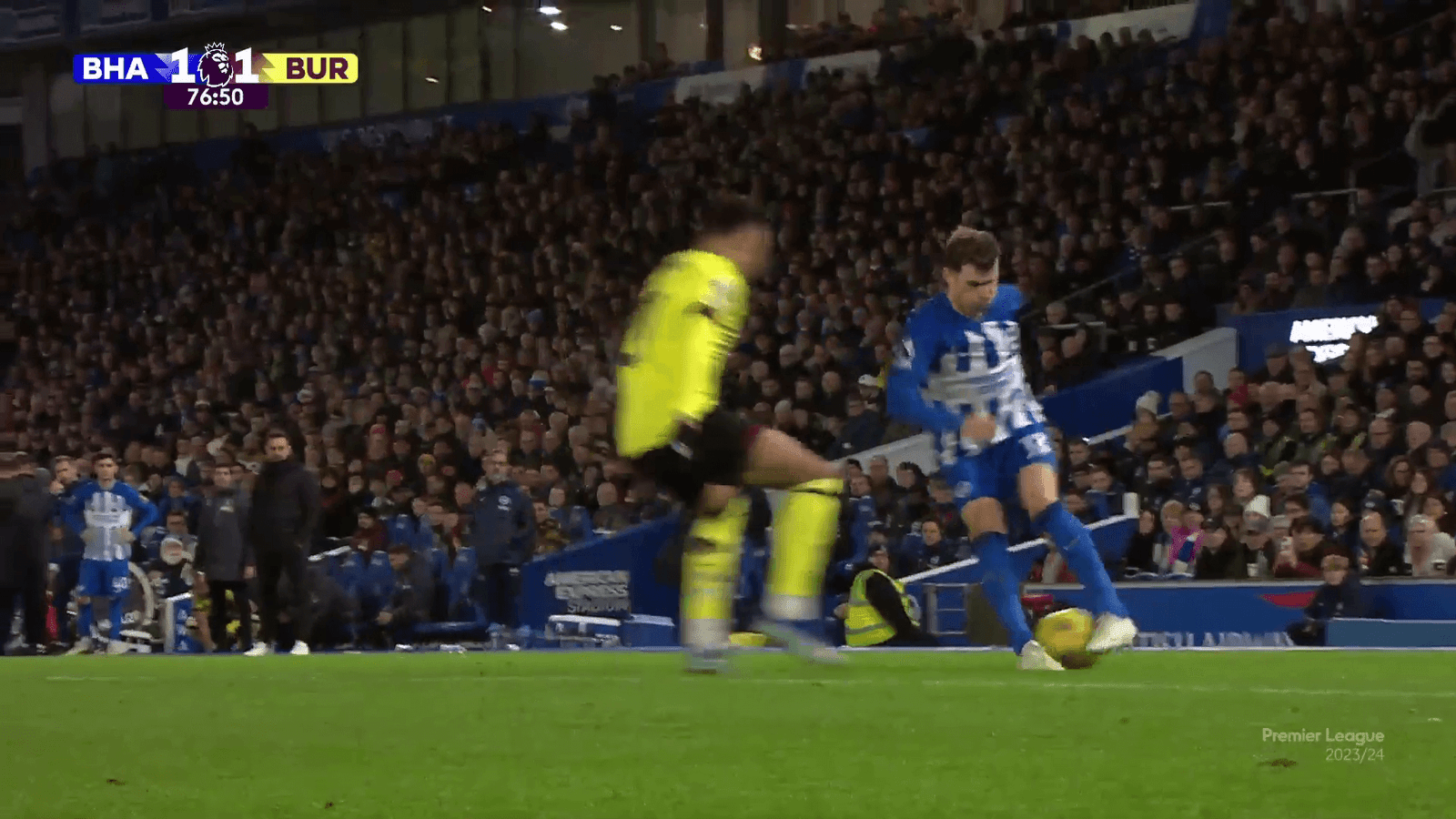
“Look how many bodies were here,” says Gross. “There are five (attackers) back post, if you take Kaoru (Mitoma) away. So it’s all about hitting a good ball in a good area. I think it’s really hard to defend because even Hinshy (Jack Hinshelwood) is behind”.
Gross consistently points out numerical advantages, noting that Burnley only have four defenders back post. His cross selection is important, hanging it up enough to the back post to find the overload, but without bringing goalkeeper James Trafford into play. Gross picks out Adingra.

“Simon, maybe size-wise, is not the main target, but if you’ve an overload and make good runs, sometimes you don’t even have to jump,” says Gross, who adds that “when you’re pedalling backwards, as a defender, it’s a much harder header”.
He repeats “overloads” while watching crossed assists away to Crystal Palace (this season) and Chelsea (last season). He says they were the “same ball”, two left-footed crosses from the right, for headers by Danny Welbeck.
“I don’t care if I cross with left or right. That gives me an advantage of time,” says Gross.
Specifically on the Palace assist, Gross says, “I see the defender close me down, so I take an early positive touch away from him.”

“I know I have a yard to cross and normally we get an overload (in the box). We have four bodies here. The central to second (back) post is a good area to hit, because everything over the first man is often dangerous.”
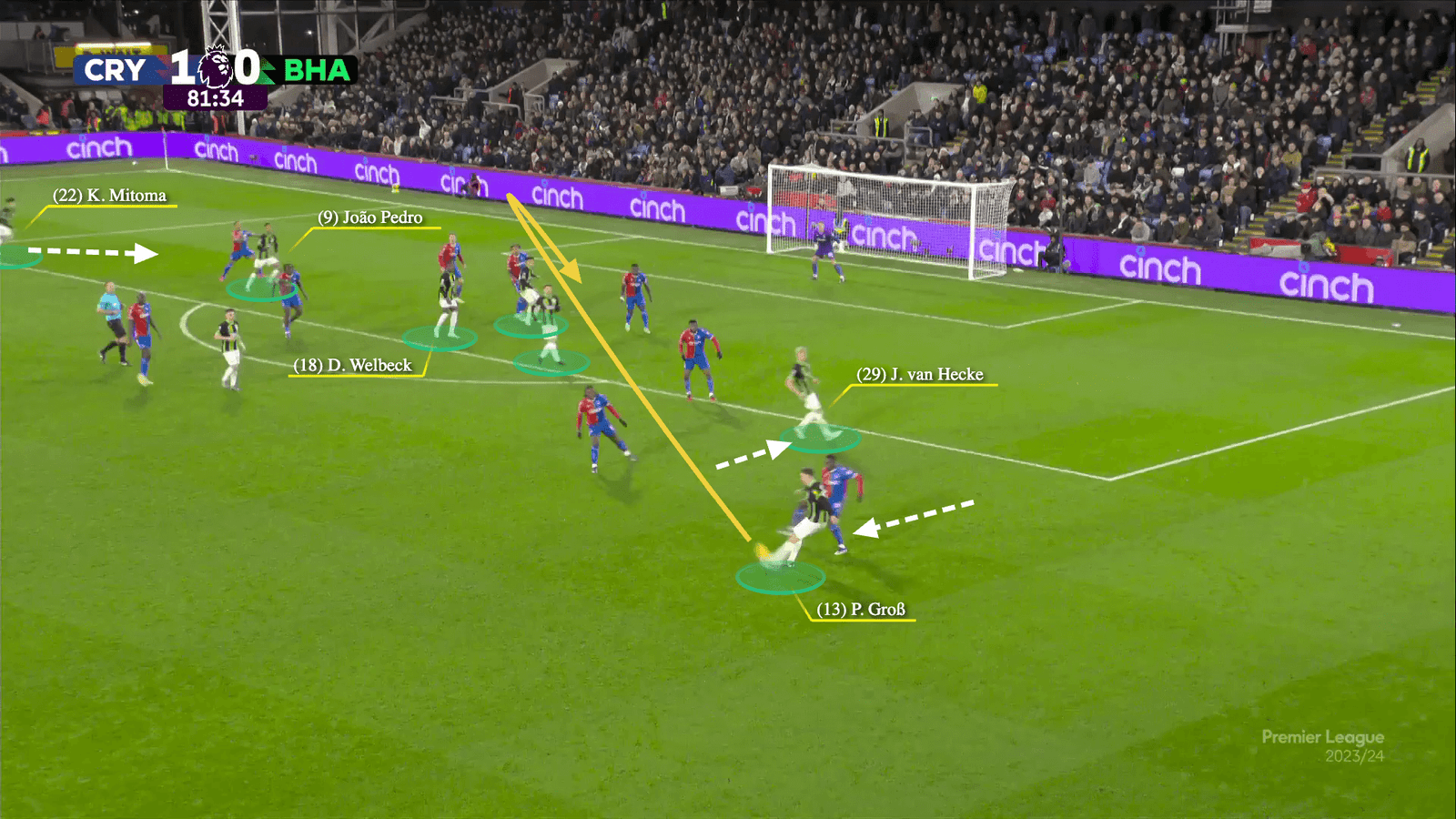
He then starts to point out the various runs that the forwards could be making, particularly with Mitoma crashing the back post. Gross has a real appreciation, at set pieces and in open play, of the individual differences of the players he provides for.
“I try to understand my striker a lot. I like to talk to them, I like to understand the characteristics,” he says. He differentiates between Tomer Hemed and Glenn Murray, who Gross played with under Hughton. Gross assisted Murray four times in 2017-18, and his first Premier League assist (at home to West Bromwich Albion in August 2017) was for Hemed.
He says both are “very good with their head, very good technique. Tomer goes in front of the man. I know Glenn loves a back-post header. That’s where he feels really comfortable, so you adjust your crosses”.
Gross has a penchant for straight-line runs inside the full-back when Brighton play wide, to find cutback positions. The perfect example: away to Middlesbrough in the FA Cup last season, running onto Solly March’s diagonal pass.
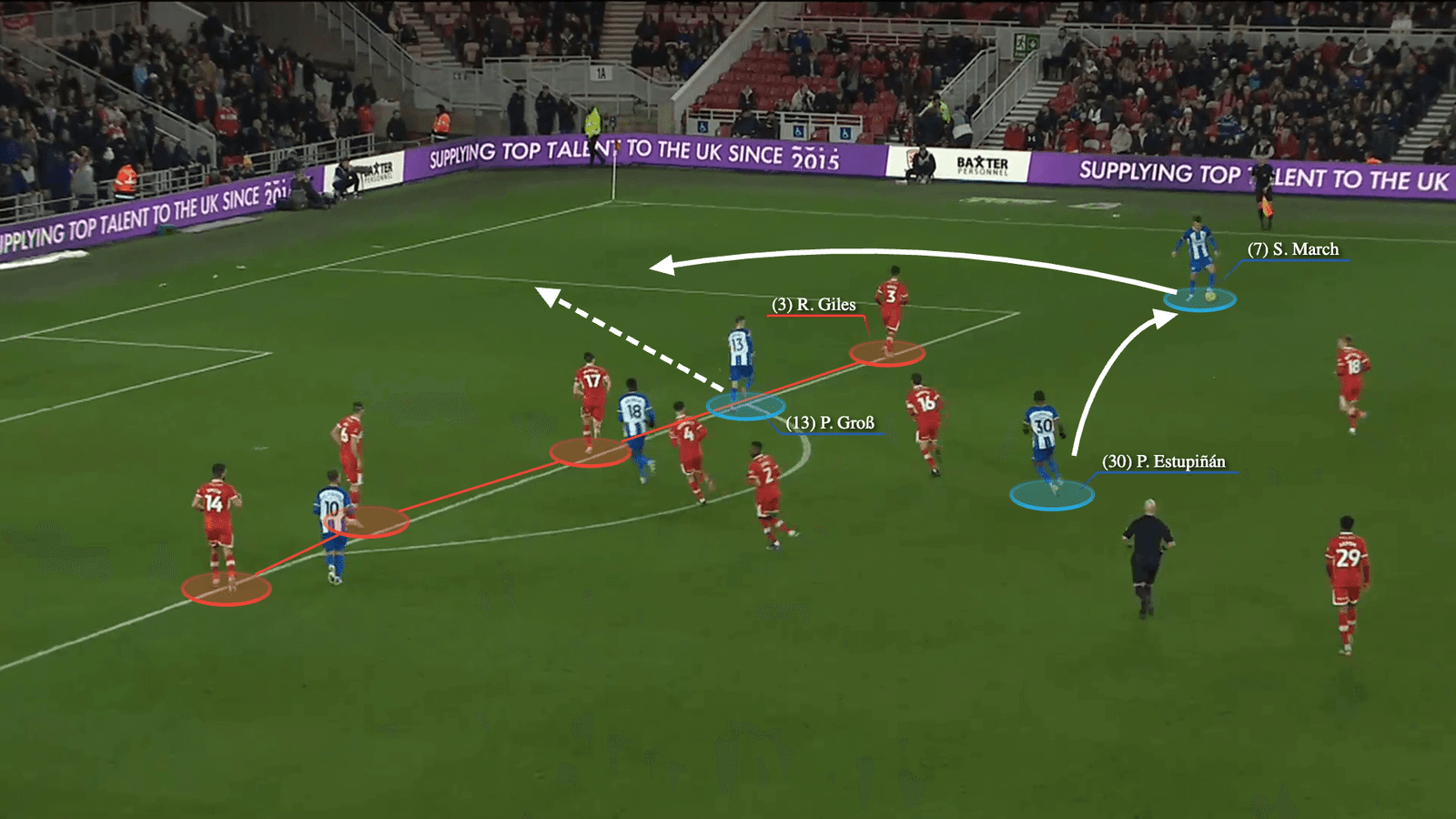
Gross pulls a low pass for the late-arriving Alexis Mac Allister, who sweeps into the far corner.
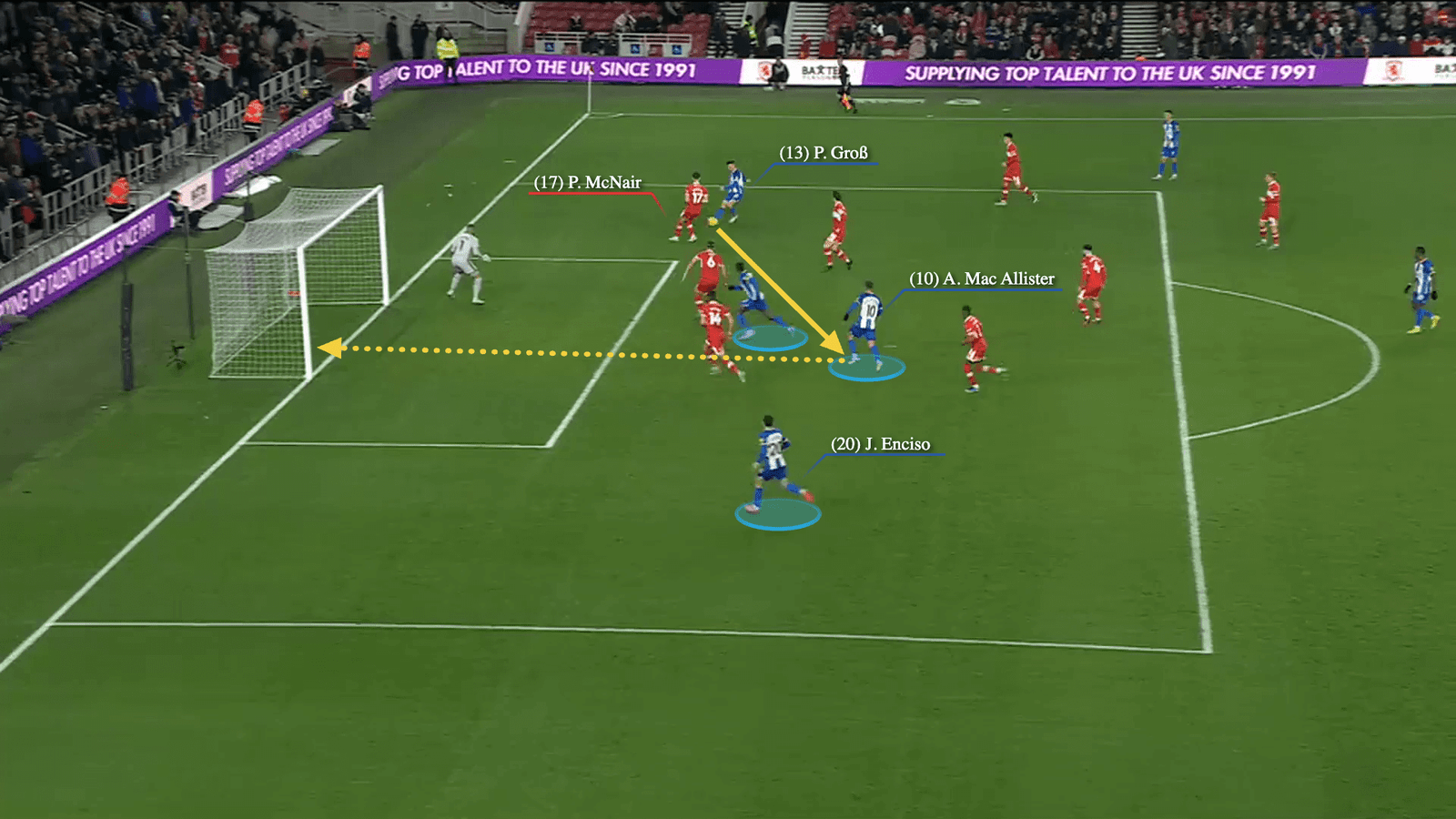
He says cross selection becomes a case of quickly assessing probabilities: “When I run here, the full-back has a decision to make. Now he goes two steps inside, (their shape) basically opens up, and now I play the cutback. But even if Julio (Enciso) then attacks the back post a little bit more, I think I still have the option. Danny (Welbeck) is the hardest to hit, probably if I hit it really good, through his (Paddy McNair’s) legs, he still can score.”
A similar goal, this time from the opposite side and against Brentford’s low-block 5-3-2, shows Gross’ versatility. He makes a counter-press regain and Brighton play round, with Igor finding Mitoma one-v-one.
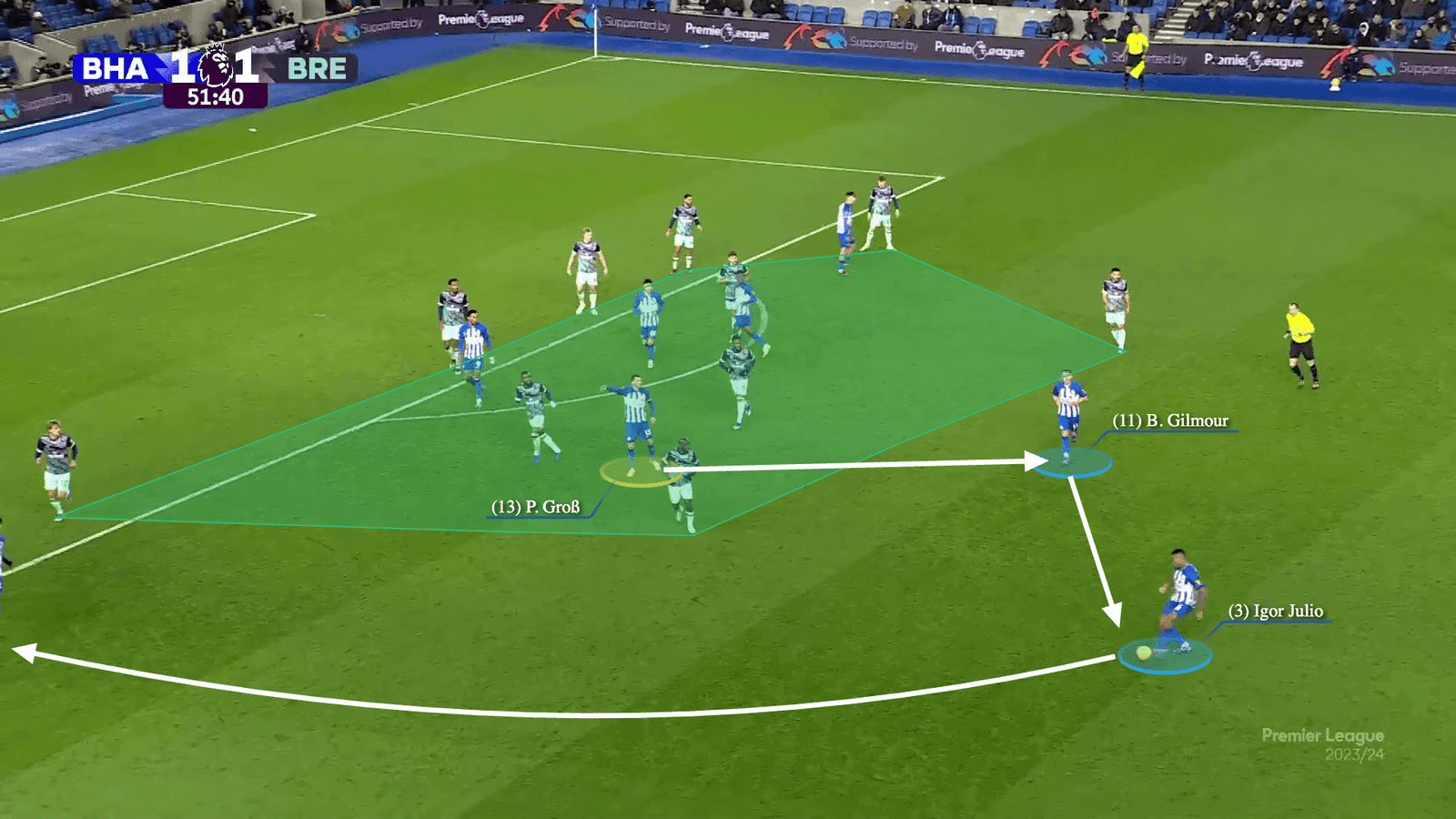
Mitoma cuts inside, past right wing-back Mads Roerslev. Gross runs on the blindside of midfielder Frank Onyeka, Mitoma finds him.
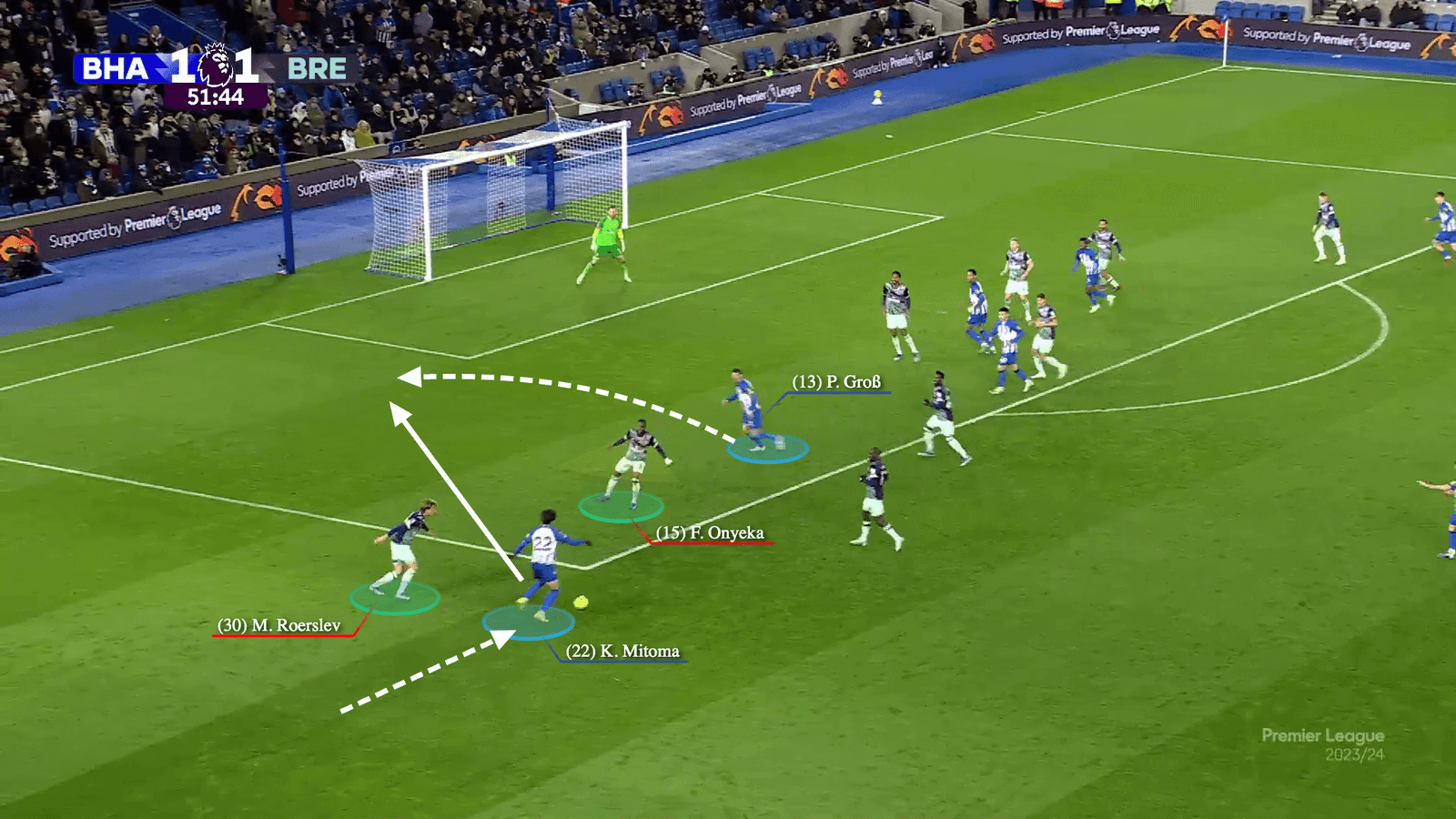
“That’s always a good position to be in, because Kaoru is a threat, he (Onyeka) maybe wants to help him (Roerslev) because he’s (Kaoru) already passed him,” says Gross.
“If he’s not there (Onyeka), Kaoru can drive inside or cross, that kind (back post) of cross. If I then run off his back, (Onyeka) has to make a decision if he comes across.
“And most of the time, where I get the ball, really close to goal, there’s a defender towards the goal. So it’s against their run, you have a chance (to find a team-mate). If they don’t (drop to goal), I hope I make the decision to fizz it across to Joao (Pedro) or Simon.”
Gross scans twice on this run, with the second deliberately right before he crosses.
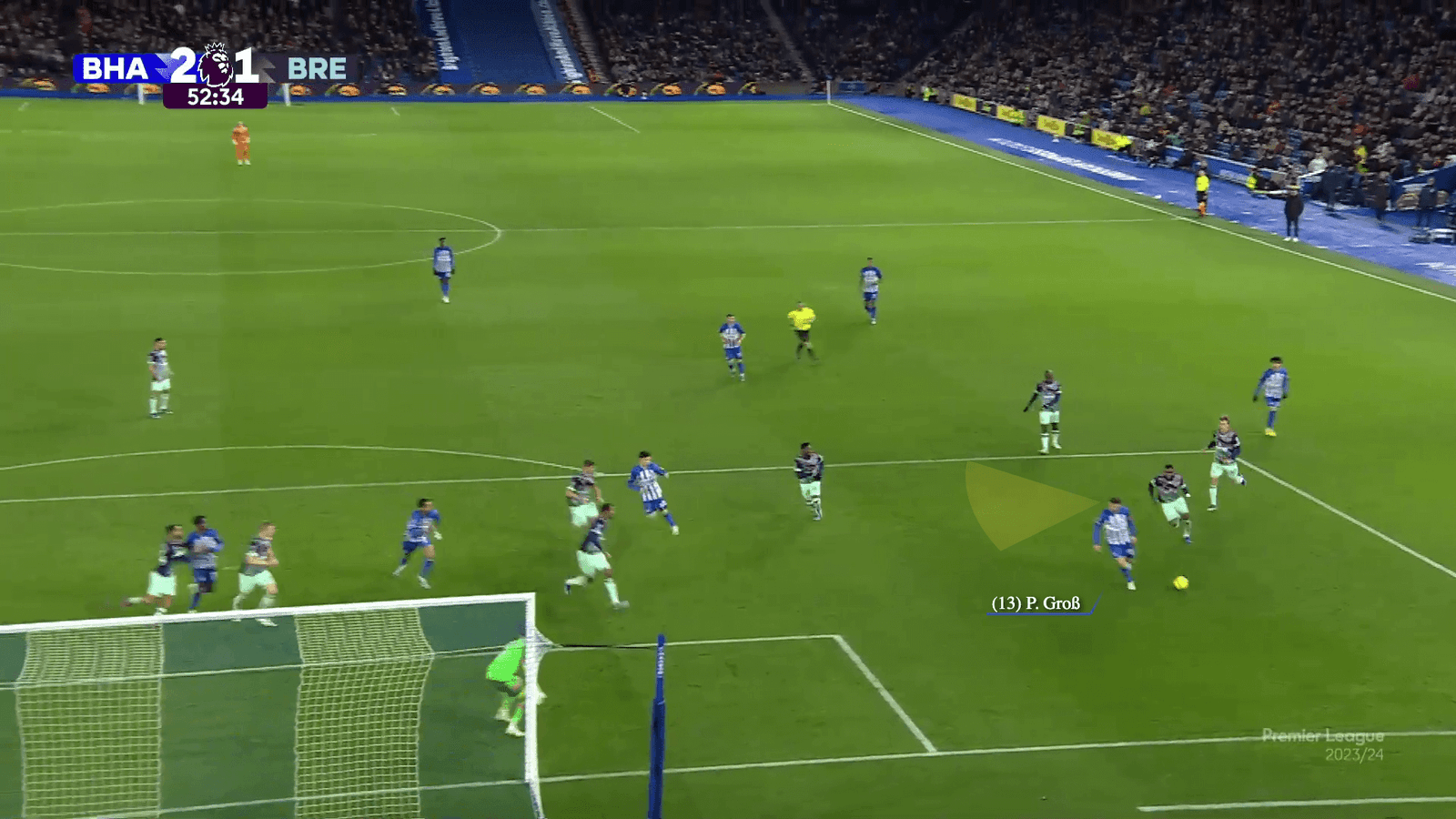
“You hit percentages and opportunities. The moment goes quick,” he says, adding that the sheer volume of bodies in the box made it “impossible” to play an on-the-floor cutback. Instead, he hangs it up for Hinshelwood to head in at the back post.
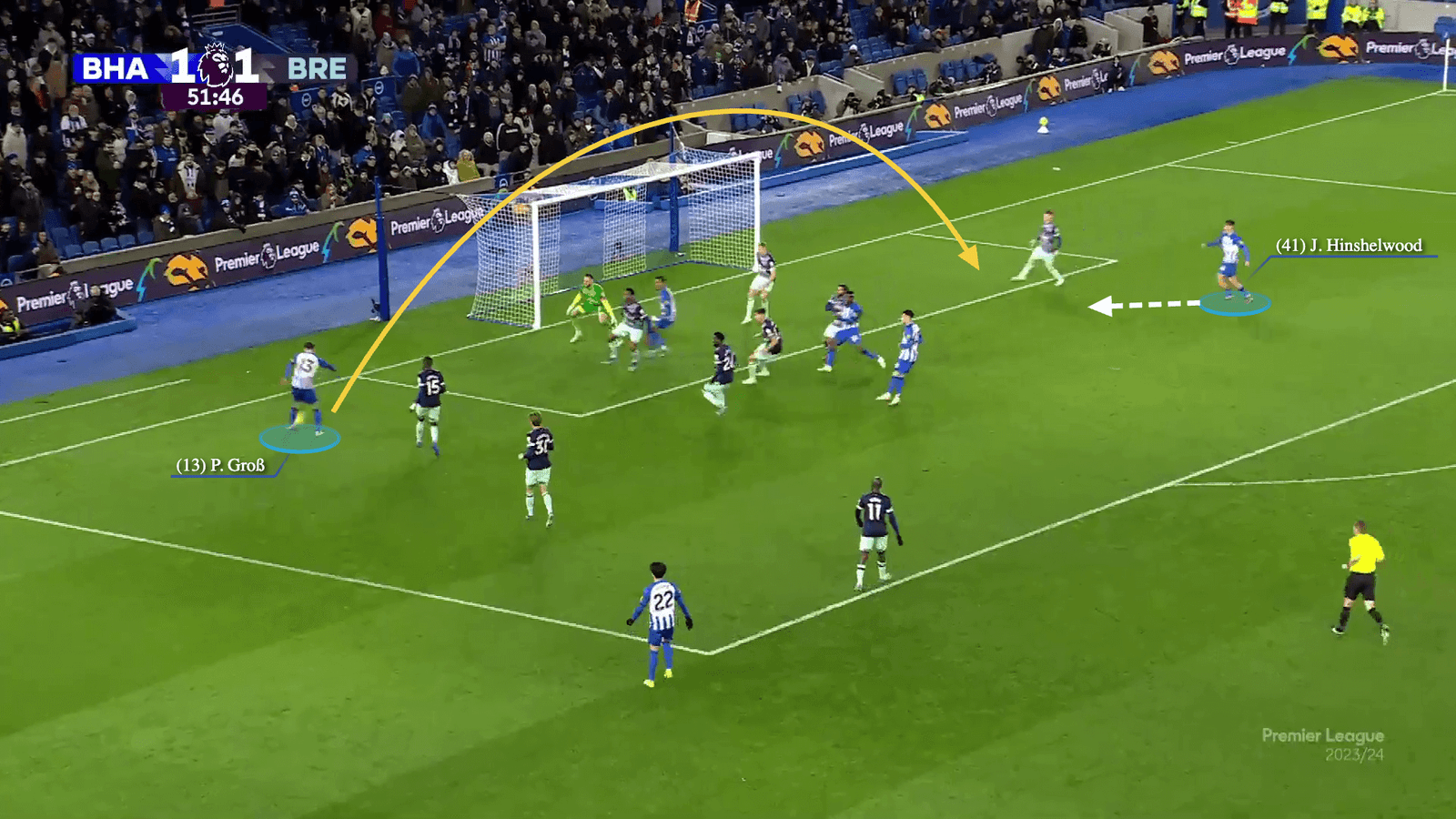
Gross appreciates team goals, specifically passing and movement details. “I try to have a picture in my head before I get the ball,” he says. “It’s not always possible, but I try the whole game. I’m mentally, hopefully, that good that I always understand the bigger picture.”
He has the aura of a footballing Sherlock Holmes, able to spot arcane specifics and problem-solve with remarkable efficiency and effectiveness.
Gross smiles upon seeing Brighton’s winning goal at home to Marseille in the Europa League. “That’s probably our best team goal, because (of) the way we play through the middle. It was 0-0, we needed to win to win the group. There’s so much detail in that goal,” he says.
“When Billy (Gilmour) plays forward, Ads (Adam Lallana) gets the ball. If Ads takes two touches, not one, the defender wins the ball. The one-touch pass to me, the weight of pass, Joao then attacks the space where he (the defender) tried to win the ball”.
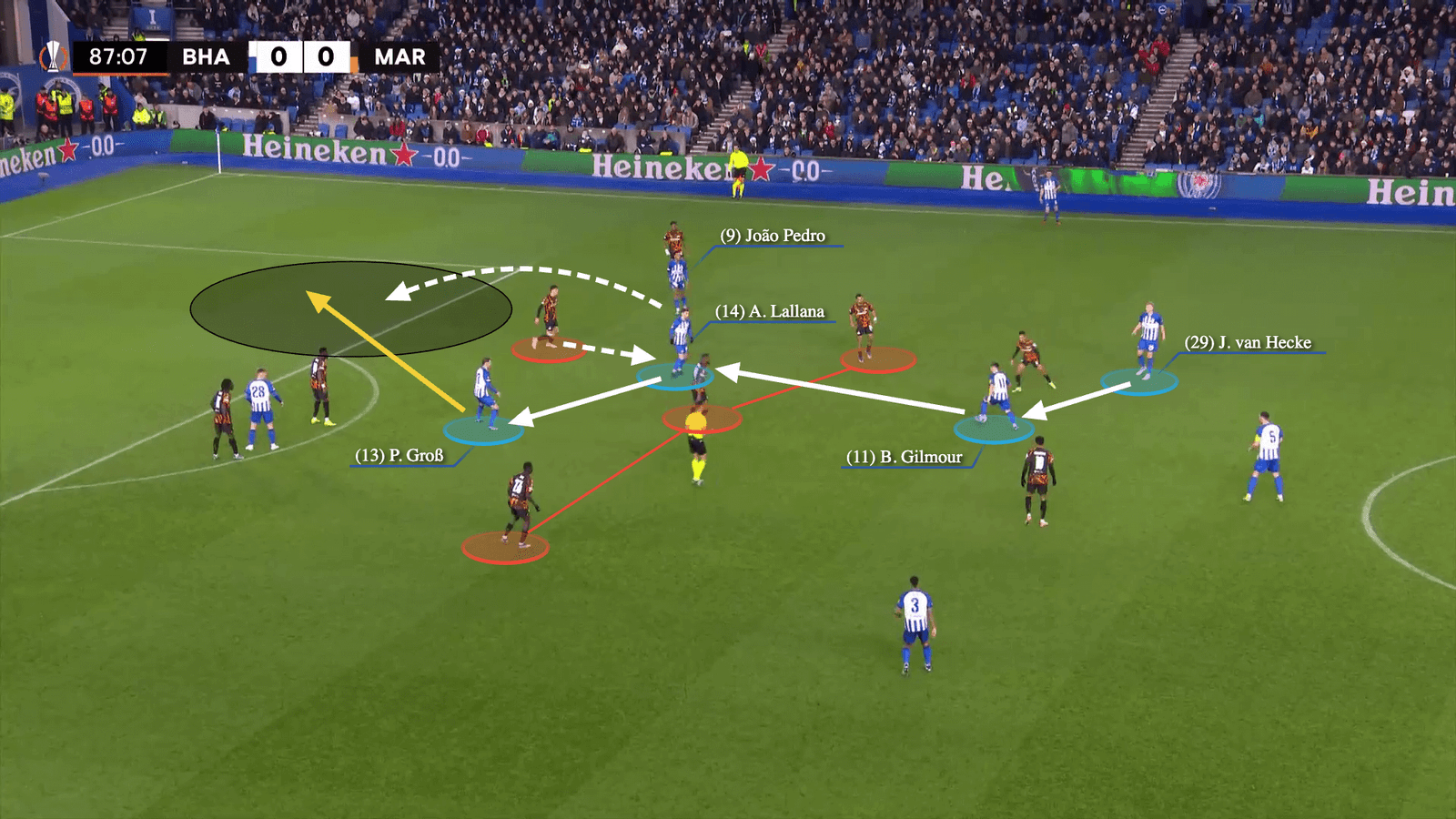
It is a scything move through Marseille’s compact 5-3-2 and demonstrates the upside of De Zerbi’s pattern-based attacking, as players know their place in the passing sequence, relative to opposition pressure. Does Gross know he will be the second pass, after Gilmour to Lallana?
“I hope so,” he says. “I’m ready to receive and I knew my pass before (to Joao Pedro). I’m not receiving and thinking, ‘Oh, now I have the ball’.
“The gap — so where it starts, we go again (pass) where it (the pressure) starts. It’s two one-touch passes, if they’re good, and a lot of detail on them. And Joao still does a lot to finish like that,” says Gross, reluctant to take anything away from the goalscorer.
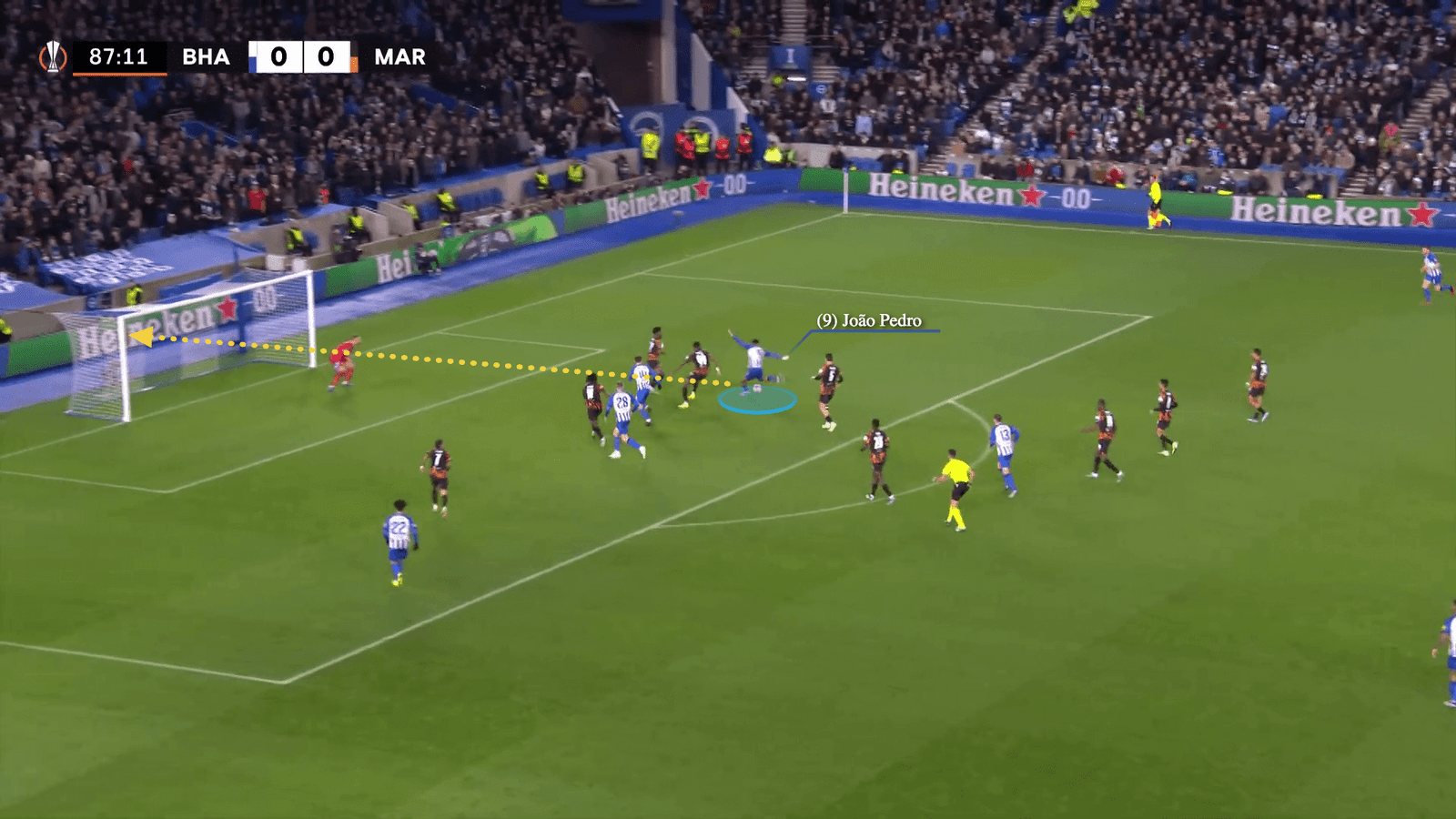
He likes his second assist against Crystal Palace in February even more: “That could be my favourite one. There’s a lot in it — winning the ball, but then (to) be positive, and then decision-making is perfect. It maybe looks easy, but (there’s) a lot of detail, even the weight of pass for Facundo (Buonanotte) to hit it first time.”
“Two goals in a minute!” 🎙️🔥 Brilliant from Pascal before Facu curled home our third! 🇦🇷 pic.twitter.com/P8PRBLE7jn
— Brighton & Hove Albion (@OfficialBHAFC) February 3, 2024
“I see the defender fully committing, because I could shoot. My first touch is positive, I could shoot now — it’s edge of the box. When I chopped, I saw Facundo’s man coming across with my other eye,” says Gross.
“That’s also a little bit of our principle, the way we play. So where the pressing starts, where the defender starts from, that’s my free man. Because I got my man out with the chop, there’s an overload, it’s a two-v-one.”
Gross has 10 Premier League assists this season, nine from open play. It is the joint-most of any player (level with Kieran Trippier and Ollie Watkins), a personal best, with 12 games still to play, and the most by a German since Leroy Sane recorded 10 in 2018-19. Gross made his senior Germany debut last September, aged 32 — an indicator of the progress he is still making.
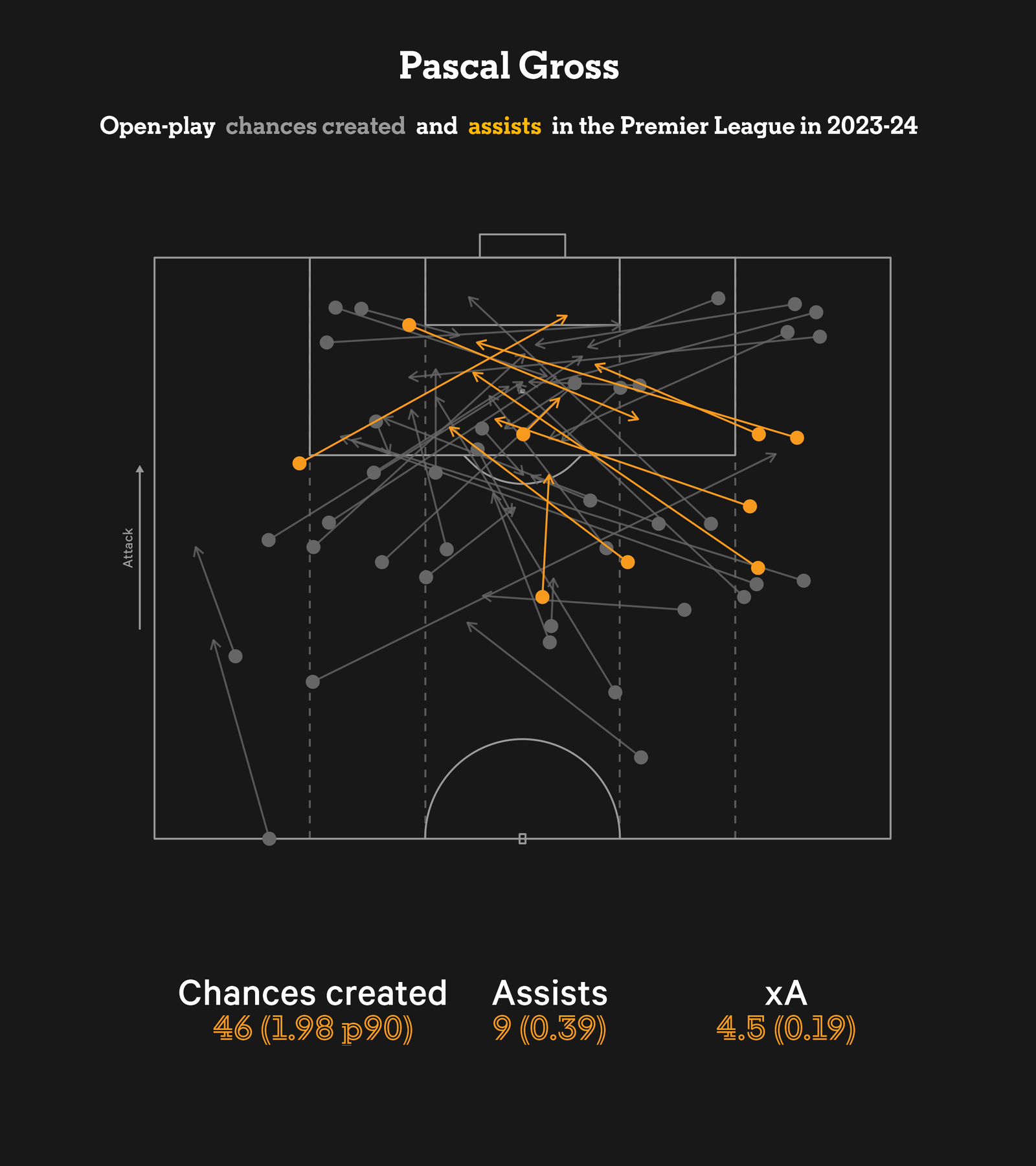
Head coach De Zerbi set winger Solly March the challenge of 15 goals last season. Has he set similar targets for Gross, or does Gross set any himself?
“No. I’m in a position where I’m not setting, because I play a lot of different positions,” he says. De Zerbi, who says Gross can “play everywhere, is clever and understands different tactical situations,” has played him at wing-back/full-back on both sides, as a No 6 in a double pivot, and in the No 10 role.
“Sometimes my games ask different things (of me). Against Everton, I played not so high because we had to take care about rest defence,” says Gross. “I had a big job there, I knew I would not get in a lot of (advanced) positions. I’m not setting a target, but I try, wherever I play, to influence the game.”
De Zerbi’s background as a No 10 in Italy, and his dogmatic approach to attacking centrally with plenty of passes, marries perfectly with Gross’ style.
“He thinks like a creative player still,” says Gross. “He also respects the characteristic of a player because, yeah, they may be No 10s, but some maybe like to play off the left, off the right, some are central. He understands all of that and you can speak with him about it.
“You see with the line-up, he wants to put you in the best possibilities that you can affect the game,” concludes Gross. If there is one thing that Gross has done at Brighton, it is affecting games. Keep playing like this and he may well be affecting games at the European Championship this summer.
(Photos: Getty Images; design: Sean Reilly)
Read the full article here


